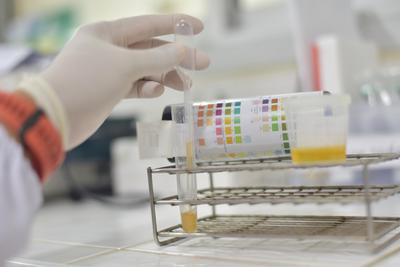Drug Test During Divorce: How to Craft a Drug Test Agreement
Health Street's guide to creating an optimal drug and alcohol testing program to address child custody issues for divorcing spouses.

When Should an Alcohol and Drug Screening Agreement Be Set Up?
Do you represent a client who is married, co-parenting, divorcing, in the process of separating, or in any other way raising a child with someone who has a known drug or drinking problem that may put the child in danger? If so, it is vital to set up an agreement that they will be tested for the substances of concern.
When children are involved, a drug testing program should be set up as soon as the partner identifies the problem. But it often isn't addressed until the couple is separating or going through a divorce, and in that case, drug tests will be ordered by a family law divorce attorney. Or there may be a court-ordered drug test requested through the family court hearing the case.
If you are helping your client negotiate a child custody case, it is essential that a drug or alcohol testing agreement is included in the final settlement.
Crafting an Alcohol and Drug Testing Agreement for a Child Custody Case
A drug and alcohol testing agreement for divorced parents should include six important considerations to be effective. Family attorneys and divorcing partners frequently contact Health Street for help in setting up drug or alcohol testing programs, as part of divorce mediation, to ensure the children's safety. A consultation with drug testing professionals ensures that your client orders the services they need for accurate, timely testing for custody or visitation cases.
This guide is meant to help lawyers and their clients understand the important points to include in a child custody testing agreement for it to be effective..
Many conservative judges find that the use of drugs, whether or not it can be shown that the use occurred during parenting time, is a significant factor when determining the fitness of a particular parent.
The use of illegal drugs and overuse of alcohol by one parent could result in a denial of visitation rights or the requirement of supervised visitation.
How to Structure the Agreement
These six components should be considered when structuring the testing agreement:
Having a clear and precise testing agreement helps to bring about a smoother divorce mediation process.
1) Frequency
How often should the tests be administered? Should they be on-demand, scheduled, or random? The agreement should indicate the testing frequency, such as weekly, biweekly, or once a month. Popular options include weekly random drug or alcohol urine tests; monthly hair tests (which have a longer detection window than urine); and periodic random testing, such as every two weeks at a randomly chosen time. Less common choices are pre-custody testing (the parent must pass a Breathalyzer each time they pick up the kids); post-custody testing (immediately after being with the child); and spouse-initiated testing (one partner requests that the other is tested).
2) Notification Requirements
How is the parent notified that they must present themselves for testing? How soon must they appear? The agreement must be crystal clear, so that parents can't claim that they weren't properly notified. Many people will use a third party agency like Health Street to notify the parents by phone, email, and/or text messages in the morning. They are then required to appear that same day to be tested.
3) Specimen type
Will the test be conducted using urine, breath, blood, or hair? The agreement must specify the specimen type. Each one varies in its purpose and length of detection. The most common is urine testing, but it only picks up recent use within the past week for most drugs. Hair tests can go back up to 90 days. A breath alcohol test has a specific purpose, as it is the only method that can show current intoxication. Blood alcohol PEth tests can detect alcohol usage in the past three weeks.
4) Drugs to Test For
The drug screens you will require depend on various factors, such as if the individual has a history of a particular type of drug abuse. Basic drug screens only detect 5 drugs, and there are dozens of screenings to choose from. The agreement must specify which test panels are required. We recommend that you base this decision on intimate knowledge of the case and the parent's likely drugs of choice. If they have a history of substance abuse, they may choose to do different drugs to avoid detection. This is especially true if a comprehensive panel isn't required.
5) Reporting of Results
How are test results reported? In most cases, both parties should receive all results. The attorneys will often get copies of the report, as will the court. The agreement may state consequences that are tied to the test results, such as "if a test is positive, visitation is suspended for 30 days."
6) Payment Responsibilities
Who pays? The document must clearly state who bears the cost of the testing. There are four common choices:
Are Drug Tests Required in Divorce Cases?
Drug screening is not required in every case. Usually, a parent must request testing, and must provide evidence of their partner's substance abuse problem. A court may order testing to decide child custody cases in the best interest of the child.
Which Types of Drug Tests Do Courts Order for Divorce Cases?
Courts typically order urine drug and alcohol tests, as they are seen as the least intrusive method. However, the detection window for urine is limited for most drugs—up to seven days.
Common Drug and Alcohol Tests required by Divorce Agreements
Every situation is unique, and the tests ordered should be based on the specifics or the people involved and the drugs they are known to use or have used. Nevertheless, here are some of the most common tests that we see are included as part of these settlements:
Health Street Can Help
Health Street helps attorneys and parents set up drug and alcohol testing programs during divorce, and we are frequently designated to administer the random testing programs for extended periods of time. Feel free to call us at 888-378-2499 for more information or to discuss setting up a program or having us administer drug and/or alcohol testing on an ongoing basis pursuant to an agreement you have already executed.





